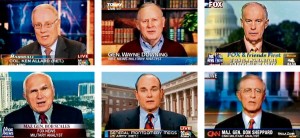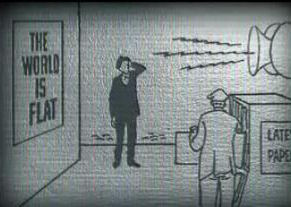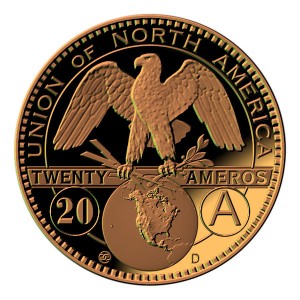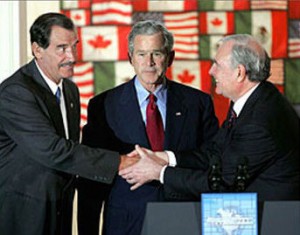Previous entries:
Part 1
Part 2
It’s a situation I think that the American people will understand if it’s ever brought to them, except there’s just no politician out there who’s going to do it, as far as I can tell. – Michael Scheuer, October 22, 2005.
Have you ever read about the reasons they attacked us? They attack us because we’ve been over there, we’ve been bombing Iraq for ten years. – Ron Paul, May 15, 2007
I just had to post that Scheuer statement and the subsequent Ron Paul statement because when I heard the Dr. Scheuer interview just a few months ago, it was funny to note that history had proven him wrong – Ron Paul stepped up to the plate and delivered the information to the people.
So let’s address Dr. Paul’s key question. Could it really be that simple?
Going back to my statement that for any set of circumstances, there are many answers provided for the problem – many conflicting answers – but there is always one key question: From the perspective of root cause analysis, the key question is the one that leads to and addresses the root cause. All of the proposed “solutions” are varied and conflicting because they address symptoms, which are the many outcomes of the root cause. They are not causes in and of themselves, but are the systemic effects of the root cause. Working on the symptoms does not fix the problem, in fact, it often makes it worse. Statistically speaking, this is known as tampering with the system. It confuses and distracts us from the root cause with a tangled web of cause and effect created by the tampering. I’ll work on root cause analysis and tampering further in another post, but for now, suffice it to say that discovering and working on the root cause is the key to solving a problem, while working on the symptoms does not improve the system, and usually only makes it worse.
Ron Paul’s question cuts to the heart of the problem:
The problem is a foreign policy of interventionism.
What motivates someone to give their own life in a suicide attack? Do they hate us because we’re rich and free, because our women wear skirts, because of our movies? And if they did, would that be sufficient to motivate them to carry out a suicide attack? A partial answer can be found in the observation that the Ayatollah Khomeini tried for two decades to motivate people to hate Americans for these reasons. It didn’t work.
A more concise answer is provided by Dr. Robert Pape, who is considered the world’s foremost authority on suicide terrorism. Dr. Pape has cataloged all of the suicide attacks in the world, going back to 1980. He researches the motives behind each of them, as stated by the groups sponsoring the attack. His data is conclusive: The motivation for 95% of all suicide attacks has been military occupation – especially when it is an occupation by a people of a different religion. Al Qaeda recruits suicide attackers from volunteers, not its long-time members. These are people who feel their backs have been pushed against the wall. Perhaps they’ve lost a family member to war or occupation, or perhaps they are Islamic fundamentalists with a belief that the US has launched a war against their religion. Either way, they are willing to give their lives to stop it.
Michael Scheuer, the former 14-year head of the CIAs Bin Laden unit, explains that Al Qaeda lured the US government into war in the Middle East with the attacks of 9/11 because of its interventionist foreign policy; citing US support for Israel, occupation of the Arabian peninsula, occupation of Muslim countries, mercantilist oil policy, alliances with governments that oppress Muslims, and support for Arab tyrannies and police states.
With a clear understanding of the problem, we see that the solution is simple: An immediate and full scale withdrawal from Iraq. An example of working on the symptoms is the escalation (aka “the surge.”) It is an attempt to gain control by pushing harder, with the belief that the problem is internal violence, and the solution is more control. Internal violence is a symptom, a result of a foreign policy of intervention and its concomitant manipulation, war, and military occupation. Escalation, then, does not solve the problem, it makes it worse. Withdrawal addresses the root cause and solves the problem.
What is the best way to protect American citizens? To put a halt to the activities of the US government that generate hatred and violence toward us. This means minding our own business, ending the policy of foreign intervention. The people of other countries that are having problems with their own governments will focus there efforts where they belong: Fighting their own government’s oppression. The US, minding its own business and promoting liberty at home, can serve as the example; the shining beacon of freedom to which others aspire. This is a policy of non-interventionism, and it is distinctly different from isolationism. Isolationists want to cut ties with the rest of the world, withdraw, and raise the barriers. Non-interventionists encourage trade and practice diplomacy, but do not engage in entangling alliances.
Intervention doesn’t only mean war and occupation. It also encompasses manipulation of foreign governments, taking sides in conflicts, and subsidizing or sanctioning other nations. Notwithstanding the unconstitutionality of using American taxpayer’s hard earned money to send to foreign governments, the money finances violence against the peoples of other nations. The money always goes to the dictators and tyrants, fueling anger toward the US by the oppressed. Economic sanctions don’t hurt governments; in fact, they assist them by redirecting anger from local government to the oppressive empire. The world of Islam is quite divided in terms of sectarianism, different theological interpretations of Islam, ethnically and linguistically – but mutual hatred for US foreign policy helps them paper over their differences and unite against a common enemy.
Let us return to Randolph Bourne’s statement: War is the Health of the State. What is government’s interest in war?
Thomas Jefferson noted that it is the natural course of things for governments to grow in power and for the people to yield liberty. This process is accelerated in times of war. The people, desperate for safety, willingly cede their liberties to the government for more protection. The opportunistic government, always seeking to expand its power and control over the people, generates a constant stream of bogeymen to keep the people in fear. There’s always another Hitler. The so-called “war on terrorism” is perfect for government because the enemy can never be defined or eliminated. It is a perpetual war.
War rallies the people around their government. With the puppet media as its propaganda horn, jingoism and belligerent nationalism are the order of the day. Flags fly and “support the troops” magnets adorn vehicles. French Fries become “Freedom Fries.” George W. Bush’s approval rating dropped as low as 51% before 9/11. Immediately after 9/11, it skyrocketed to 90%, the highest approval rating ever seen in a Gallup poll. The worst despots in history have always been able gain the support of the people when they’re at war.
The Military Industrial Complex benefits from interventionism. War, of course, is profitable for the MIC. When the US government is at war, or when it is subsidizing foreign militaries; guns, bombs, and war machines are in demand. Times of peace are times of doom and gloom in the MIC. Destruction of infrastructure generates rebuilding contracts for favored contractors. The MIC looms large over Washington with powerful lobbying interests, constantly pushing for more intervention. When the MIC benefits, elected and unelected officials benefit. Big money awaits those moving through the revolving door of politics, executive positions in the MIC, and lobbying firms representing their interests.
And so there you have a vicious cycle: Government intervention begets violence against US citizens, the government responds with war, the people rally around the government, give up liberty for safety and lose both, government grows in size and power and steps up its intervention. War is indeed the Health of the State.
I might add “until the state has destroyed the wealth that created it and implodes.” History has shown time and time again that this does not end well.
Epilogue
I am not a pacifist. I believe in self defense, I will fight when threatened, and I believe that there are some people who could use a good killin’. My views expressed here represent a personal awakening – to understanding that the US government is not protecting us, and that in fact, it is our biggest threat. Once again, we have seen the enemy and it is us.
Looking back, it would be easy to feel guilty about being a war supporter and a fool for government propaganda, but my view is that free people don’t want to be involved in government and world affairs. They are busy providing for their families, worrying about their day-to-day business, seeking their own goals. Most people simply want government to do its job; give them what they expect from government when they want it, and leave them alone the rest of the time. But as the vicious cycle repeats itself, the situation for the people worsens. There comes a time when enough is enough, each of us has our own limits. I only hope the American people wake up before it goes too much further; this loss of freedom and the rise of tyranny. I’m encouraged by the words of Samuel Adams, who said that it does not require a majority to prevail, but rather an irate, tireless minority keen to set brush fires in people’s minds. That is my purpose in these posts.
If there is to be a Second American Revolution, let it happen in my lifetime. I would rather be part of the fight than to be responsible for passing the burden to future generations.
Men, it has been well said, think in herds; it will be seen that they go mad in herds, while they only recover their senses slowly, and one by one.
-Charles Mackay
I wish to extend a debt of gratitude to Ron Paul, the late Murray Rothbard, and Lew Rockwell and the Mises Institute for helping me recover my senses.





